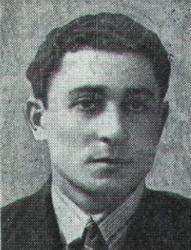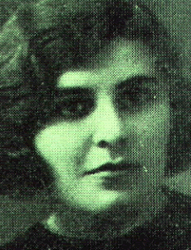
Translated from VYB P. 498 by M. PoratI recall with much warmth the Kivilevitsh family. The family was renowned for their dedication and self-sacrificing nature during the First World War. And this was their story. At the outbreak of the war, two Yeshiva-students were stranded in Volozhin. They could not reach their home towns since their towns were already occupied by the Germans at that point. Even worse, they were at an age in which the Russian authorities could draft them for service in the war, but they refused to serve in the Tsar's army. The Kivilevitshes took an enormous risk and concealed the young men in the family's apartment for three years (from 1915 until 1918). They knew that hiding "deserters" greatly endangered them: if they were caught they would receive very severe punishment, possibly even capital punishment.
The Yeshiva students returned home after war and told their parents about the kindness of the Kivilevitsh family. Their parents sent a thankful letter to Volozhin. The letter was very emotional and often brings its readers to tears. I've read this letter and I too, shed a tear while reading it.
The family's mother, Sima Kivilevitsh (nee Shriro) was born in Molodetshno. She lived in Yatskevo after marriage. She had a generous heart. Her donations to poor people were distributed largely and secretly, so as not to shame the needy.
Mother honoring was the cause of my first encounter with Shneur. The Volozhin Khevre Kadishe (Interment Society) would fix the burial place and its price on their own choice.
When his mother died, Shneur went to the Khevre Kadishe and pronounced these words: "All of you know who my mother was, and the good deeds she has done, you also know. Therefore choose the best place to which she can be brought to eternal peace and I will pay full price for it."
He would say Kadish not like a member of the enlightened circle, but as would be done by a simple Jew, at Shakharis (Morning Prayer), at Minkha (Midday Prayer) and Maariv (Evening Prayer), every day and without substrate. He did this without missing one single day during the Mourning Year. As it's written "the Fathers' is their sons' glory". Shneur had seen his glory and honor in the image of his mother. He might be an example in honoring mother and father for the children of our generation.
We prayed with Shneur in the same Klayzl. Both of us had places at the Orient Wall (facing Jerusalem). He inherited this place from his father Moshe. His father, who was a sage scholar, had bought the place at the honored wall before the First World War. Prior to his demise he donated his extensive Judaic library to the Klayzl.
I remember an event from Shneur's life that showed his national pride and readiness to passionately defend Jewish honor. The son of Vartman (the Volozhin district governor's (Starosta)) was a High school student in Warsaw. After lunch on Saturdays, Jewish families would take a walk in Count Tishkevitsh's park. The Gimnazist, who was an ardent anti-Semite, came back to Volozhin during his vacations and took a sadistic pleasure in taking his father’s horse and bursting into peacefully walking groups to create dismay among them, on more than one occasion hurting or wounding someone.
